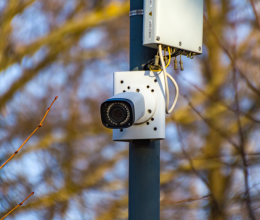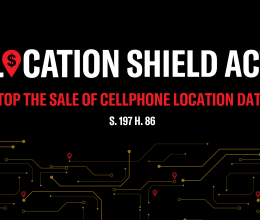

Emails show surveillance oversight laws can stop secret police-Amazon agreements in their tracks

Documents obtained by the ACLU of Massachusetts, published today for the first time, show that surveillance oversight ordinances are effective means of stopping secret agreements between companies like Amazon’s Ring and local police.
For years, the ACLU and other digital rights advocates struggled with a problem: How can we keep up with the rapid pace of surveillance technology development and acquisition by state and local government agencies? Since 9/11, state and local law enforcement have been acquiring — mostly in the dark and often with federal funds — surveillance technologies like license plate readers, surveillance cameras, and even secret cellphone snooping devices called “stingrays.” All of this was happening without any democratic approval, oversight, transparency, or accountability. The plague of secret surveillance, we realized, was spreading beyond anyone’s control. Meanwhile, ordinary people were locked out not only from deliberation about how local governments ought to conduct surveillance and protect privacy, but also the threshold question of whether certain technologies ought to be used at all.
In response to this nationwide problem, we came up with a novel solution: Instead of trying to scrutinize each new technology as it emerged, whack-a-mole style, we would instead create a democratic, transparent, and accountable process, whereby every local government agency would need to get approval from the local legislative body before acquiring a new technology. This system, which we call Community Control Over Police Surveillance (CCOPS), has now been implemented in cities and counties across the United States.
And emails recently obtained by the ACLU of Massachusetts show it works.
Last month, the Washington Post revealed that over 400 police departments across the United States have entered into secret relationships with Amazon, to build out a private-public surveillance partnership using the company’s Ring surveillance doorbell. The latest reporting follows an extensive investigation by Vice’s Caroline Haskins, who in late July published the first report on the secret agreements, based on emails she obtained from a Florida department. In early August, Haskins reported that at least 200 police departments were secretly working with Amazon to push the doorbell surveillance in their communities, essentially acting as marketing agents of the world’s most powerful technology company. Thanks to the Post’s reporting, we now know the number of participating police departments is substantially higher.
Following Haskins’ reporting, my office submitted 100 public records requests to police departments across Massachusetts. We’re still waiting for documents from some of those departments, but we are publishing emails we received from the Cambridge Police Department (CPD) now, because they tell an important story about the impact of local surveillance oversight laws.
In December 2018, the Cambridge City Council passed a comprehensive surveillance oversight law, after two years of working with the ACLU and other local advocates. That law requires local agencies, including the police, to get permission from the City Council to enter into surveillance data sharing arrangements and to acquire new surveillance technologies. The ordinance, which also applies retroactively to technologies already in use, takes effect today.
In our records request to CPD, we sought information about its communications with Amazon’s Ring, among other documents. The department’s response shows that the City Council’s new ordinance does exactly what it’s designed to do: stop secret surveillance, and ensure democratic oversight and accountability.
For months, the emails show, Ring employees emailed back and forth with members of the CPD, urging the police to enter into an agreement with Ring to create a “law enforcement portal” for Cambridge surveillance videos. Two days after the City Council’s unanimous December 11, 2018 vote to pass the surveillance oversight ordinance, Ring’s Law Enforcement Liaison/Territory Manager Brad Wentlandt wrote to the Cambridge police:
The Cambridge surveillance ordinance has been getting some national media attention and has been a topic of discussion here.
In our discussions at Cambridge we talked about how the Ring Law Enforcement Portal and Neighbors App seems to fit in with the stated desire of the Cambridge Common Council to have the police department implement a voluntary, consent- based process for gathering video.
I’d like to introduce our PR Coordinator Morgan Culbertson who is copied on this email and ask that we set up a conference call in the near future so we at Ring can get a better understanding of the surveillance ordinance and discuss your thoughts on messaging.
In response, an employee of the Cambridge police wrote:
While we appreciate your interest in connecting with us, a call at this point is a little too premature at this time. Once we make progress internally with next steps on moving forward with the ordinance, I will be sure to be in touch.
Fast forward to 2019. In February, not satisfied with that response, Ring wrote again:
It’s been awhile since we’ve connected and I wanted to reach out and see if there’s anything you need to help inform your decision relative to the Ring Law Enforcement Portal.
Cambridge police rep Jeremy Warnick again declined to move forward with the partnership, citing the surveillance oversight ordinance:
Thanks for your continued outreach. We’ll be in touch as we near a decision on whether or not to proceed with the portal. There’s still a few items related to the new ordinance that we are working through before we consider adding new platforms.
Unsatisfied, the Ring employee wrote again in June 2019:
Just wanted to check in and see if there’s any desire to move forward.
We sent our request to CPD on August 2. The emails we received do not include any response to Ring’s latest communication, indicating that as of August 14 — the date Cambridge responded to our request — CPD hadn’t written back.
Kudos to the Cambridge Police Department for following the will of the Cambridge community, and to the Cambridge City Council for passing such a strong surveillance oversight ordinance. The law goes into effect today, meaning the Council and the public will soon have access to loads of information about what kinds of surveillance technologies are currently in use in the community, and an opportunity to weigh in on whether those tools are right for Cambridge. Let the sunshine in.
This blog was written by Kade Crockford, director of the ACLU of Massachusetts' Technology for Liberty Program.
Related content

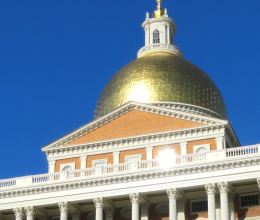
ACLU applauds new landmark data privacy legislation
May 6, 2024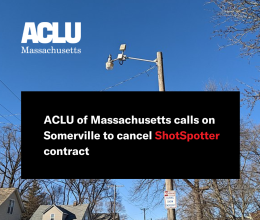
ACLU of Massachusetts calls on Somerville to cancel ShotSpotter...
March 14, 2024
Cellphone location data used to target abortion misinformation to...
February 13, 2024
Lawmakers file bill to ensure the responsible use of robots
September 13, 2023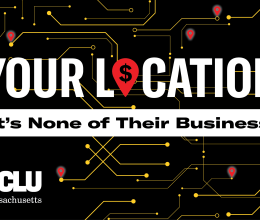
Advocates, experts call on lawmakers to ban sale of cellphone...
June 26, 2023
Reproductive advocacy groups launch campaign to bolster patient...
June 14, 2023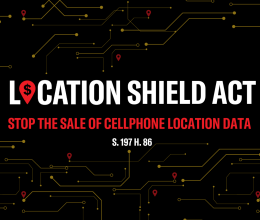
Ban The Sale of Location Data
June 2, 2023